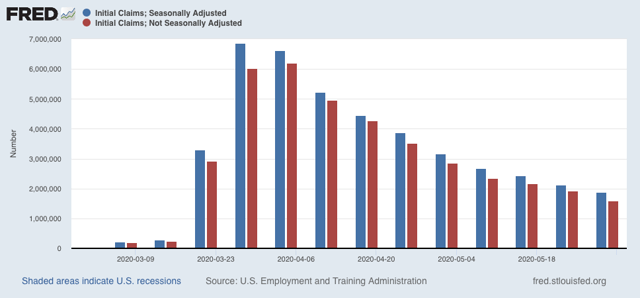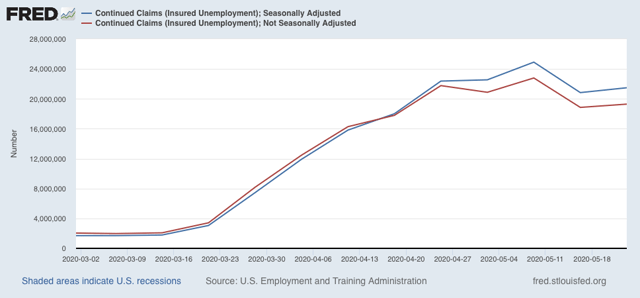- by New Deal democrat
First of all, I have a new post up at Seeking Alpha. The monthly May data has started to come in, giving us our first comparable data after the coronavirus recession struck. In housing, vehicle sales, and manufacturing, the theme is “less awful.” As usual, clicking over and reading is hopefully educational for you, as well as putting a penny or two in my pocket.
Meanwhile, weekly initial and continuing jobless claims give us the most up-to-date snapshot of the continuing economic impacts of the coronavirus to the average worker. Eleven weeks after calamity first struck, the theme is the same: “less awful.”
First, here are initial jobless claims both seasonally adjusted (blue) and non- seasonally adjusted (red). The non-seasonally adjusted number is of added importance since seasonal adjustments should not have more than a trivial effect on the huge real numbers:

There were 1.603 million new claims, which after the seasonal adjustment became 1.877 million. This is a -249,000 decline from last week’s number, and the lowest so far since the virus struck.
Since we are a month after some States “reopened,” these new claims primarily represent spreading second-order impacts.
Unfortunately, the “less bad” trend did not occur in continuing claims, which lag one week behind. Both the non-seasonally adjusted number (red), and the less important seasonally adjusted number (blue) rose, by 437,000 and 649,000 respectively, although both remained substantially below their peaks of two weeks ago:

This tells us that, as of two weeks ago, the new damage outweighed callbacks to work.
Let’s be clear: all of these numbers are awful, Great Depression-scale readings. The “good” news is still that climbing back from recession bottoms always has to start with “less awful” news, and overall this is what we got in this week’s jobless claims report. By way of historical comparison, initial jobless claims peaked in late March 2009, a little over two months before that recession officially ended.
The big caveat: the virus does not care about States’ claiming that they are reopened. There is accumulating evidence that new infections have stopped declining on a nationwide basis, and both those and deaths have started to increase again slightly. So restrictions might need to be renewed. Also, given GOP opposition in the Senate, it appears that enhanced unemployment benefits are going to end next month. Since it is almost certain that the economy will still be very depressed at that point, a further huge wave of negative impacts seems increasingly likely.